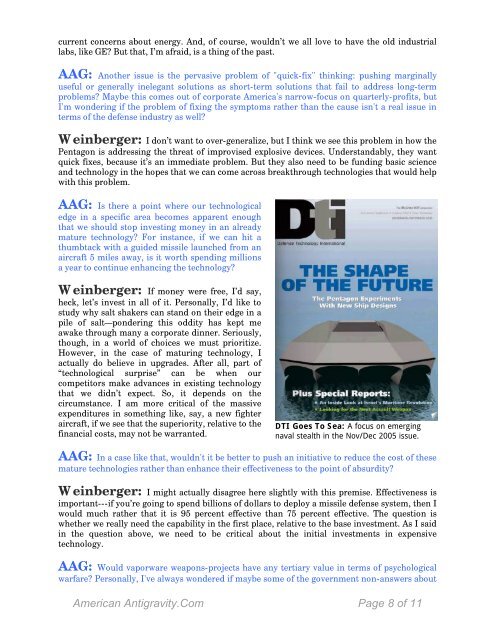Sharon-Weinberger-In.. - American Antigravity
Sharon-Weinberger-In.. - American Antigravity
Sharon-Weinberger-In.. - American Antigravity
You also want an ePaper? Increase the reach of your titles
YUMPU automatically turns print PDFs into web optimized ePapers that Google loves.
current concerns about energy. And, of course, wouldn’t we all love to have the old industrial<br />
labs, like GE? But that, I’m afraid, is a thing of the past.<br />
AAG: Another issue is the pervasive problem of "quick-fix" thinking: pushing marginally<br />
useful or generally inelegant solutions as short-term solutions that fail to address long-term<br />
problems? Maybe this comes out of corporate America's narrow-focus on quarterly-profits, but<br />
I'm wondering if the problem of fixing the symptoms rather than the cause isn't a real issue in<br />
terms of the defense industry as well?<br />
<strong>Weinberger</strong>: I don’t want to over-generalize, but I think we see this problem in how the<br />
Pentagon is addressing the threat of improvised explosive devices. Understandably, they want<br />
quick fixes, because it’s an immediate problem. But they also need to be funding basic science<br />
and technology in the hopes that we can come across breakthrough technologies that would help<br />
with this problem.<br />
AAG: Is there a point where our technological<br />
edge in a specific area becomes apparent enough<br />
that we should stop investing money in an already<br />
mature technology? For instance, if we can hit a<br />
thumbtack with a guided missile launched from an<br />
aircraft 5 miles away, is it worth spending millions<br />
a year to continue enhancing the technology?<br />
<strong>Weinberger</strong>: If money were free, I’d say,<br />
heck, let’s invest in all of it. Personally, I’d like to<br />
study why salt shakers can stand on their edge in a<br />
pile of salt—pondering this oddity has kept me<br />
awake through many a corporate dinner. Seriously,<br />
though, in a world of choices we must prioritize.<br />
However, in the case of maturing technology, I<br />
actually do believe in upgrades. After all, part of<br />
“technological surprise” can be when our<br />
competitors make advances in existing technology<br />
that we didn’t expect. So, it depends on the<br />
circumstance. I am more critical of the massive<br />
expenditures in something like, say, a new fighter<br />
aircraft, if we see that the superiority, relative to the<br />
financial costs, may not be warranted.<br />
DTI Goes To Sea: A focus on emerging<br />
naval stealth in the Nov/Dec 2005 issue.<br />
AAG: <strong>In</strong> a case like that, wouldn't it be better to push an initiative to reduce the cost of these<br />
mature technologies rather than enhance their effectiveness to the point of absurdity?<br />
<strong>Weinberger</strong>: I might actually disagree here slightly with this premise. Effectiveness is<br />
important---if you’re going to spend billions of dollars to deploy a missile defense system, then I<br />
would much rather that it is 95 percent effective than 75 percent effective. The question is<br />
whether we really need the capability in the first place, relative to the base investment. As I said<br />
in the question above, we need to be critical about the initial investments in expensive<br />
technology.<br />
AAG: Would vaporware weapons-projects have any tertiary value in terms of psychological<br />
warfare? Personally, I've always wondered if maybe some of the government non-answers about<br />
<strong>American</strong> <strong>Antigravity</strong>.Com Page 8 of 11

















